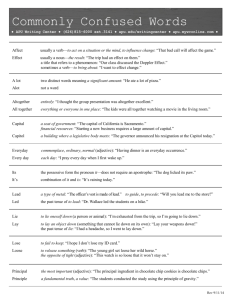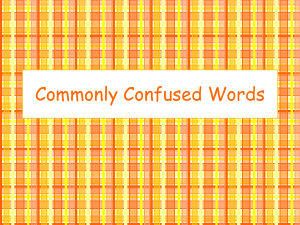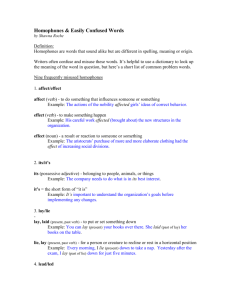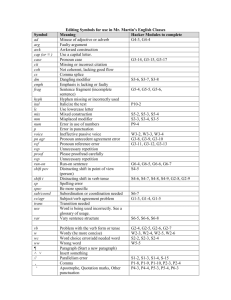Strategy 25 Edit for grammar: To 10 problems he ,
advertisement
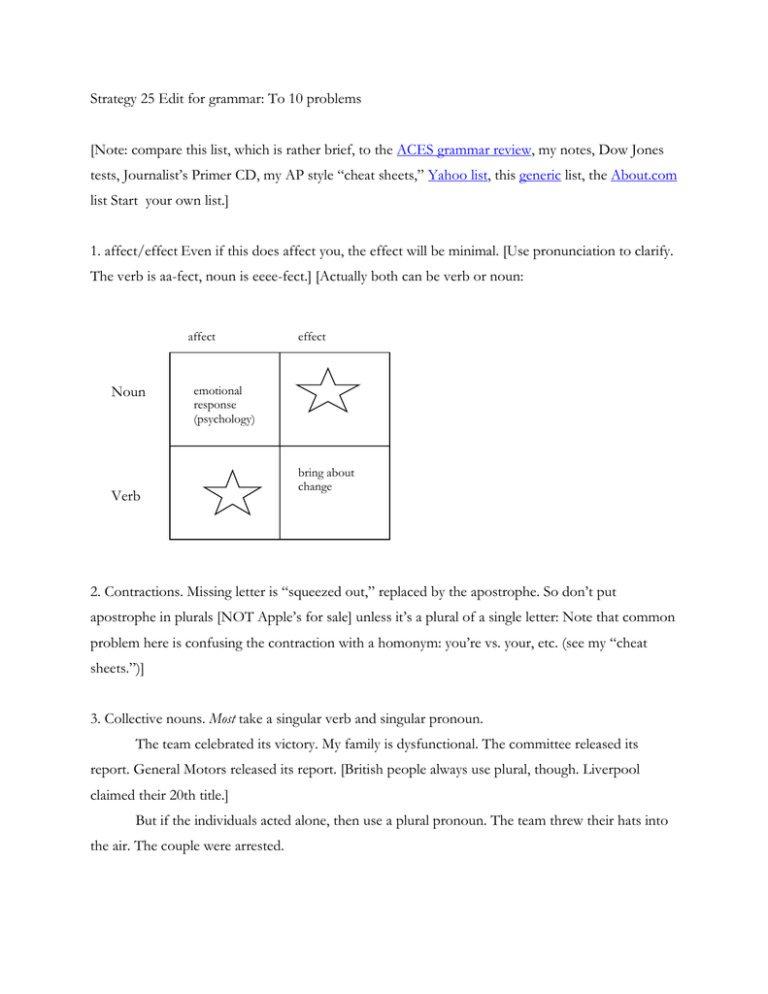
Strategy 25 Edit for grammar: To 10 problems
[Note: compare this list, which is rather brief, to the ACES grammar review, my notes, Dow Jones
tests, Journalist’s Primer CD, my AP style “cheat sheets,” Yahoo list, this generic list, the About.com
list Start your own list.]
1. affect/effect Even if this does affect you, the effect will be minimal. [Use pronunciation to clarify.
The verb is aa-fect, noun is eeee-fect.] [Actually both can be verb or noun:
affect
Noun
effect
emotional
response
(psychology)
Verb
bring about
change
2. Contractions. Missing letter is “squeezed out,” replaced by the apostrophe. So don’t put
apostrophe in plurals [NOT Apple’s for sale] unless it’s a plural of a single letter: Note that common
problem here is confusing the contraction with a homonym: you’re vs. your, etc. (see my “cheat
sheets.”)]
3. Collective nouns. Most take a singular verb and singular pronoun.
The team celebrated its victory. My family is dysfunctional. The committee released its
report. General Motors released its report. [British people always use plural, though. Liverpool
claimed their 20th title.]
But if the individuals acted alone, then use a plural pronoun. The team threw their hats into
the air. The couple were arrested.
4. Dangling modifiers. Identify the subject of each clause, then make sure that the subject is clear
(not implied).
Nestled between the driver’s legs, the policeman spotted a bottle of beer.
5. Essential vs. non-essential clauses and phrases. Issue here is mainly to use commas for nonessential stuff, but also generally “which” vs. “that”:
The book, which I borrowed, was enthralling. (non-essential additional detail)
The book that I borrowed was enthralling. The one that I bought was not. (essential)
6. Lay/lie
Generally the issue is that “lay” is transitive but lie is intransitive. Past tenses get confusing.
Please lay that on the table. Please lie down. (Note the preposition “on” or “in” or “down”
after “lay.”)
The tricky past tense ones: He lay out in the sun for hours. [past tense of “lie”; note that it’s
still intransitive]. He laid the book on the table. [past tense of “lay”]
Laying her books on the table, she left the room. [past perfect? of “lay”]
They had been lying on the beach for hours [“lie”]
7. Plurals.
Use the stylebook.
[Tricky ones: If it sounds plural but isn’t,. or has two forms: Politics is a difficult subject. But my
politics are my own.
There are 50 attorneys-general in the United States.
This happened in the 1920s. [no apostrophe]. [also}This happened in the ’20s.
[Exception: Mind your P’s and Q’s. She made straight A’s.]
8. Possessives. As said, don’t confuse plurals with possessives or contractions.
It’s easy to make a mistake. Every dog has its day., [this is just a possessive pronoun, like
hers or his which you know don’t have apostrophes; same as your vs. you’re]
Proper nouns: Generally no “s” added: Agnes’ book. Achilles’ heel.
Nouns ending in “s” The hostess’s dress. But if an “s” sound follows, leave it out [just looks
messy]. The hostess’ seat.
9. That/which. As noted. {Also that/who or whom; generally use “that” for objects, who/whom
for people or pets with names. The student who enjoys editing will be better at it. The book that I
bought was enthralling.
10. Who/whom
Who is subjective(nominative) pronoun, whom is objective. SO is the person doing or
receiving the action? [Best tip—replace the pronoun with “he” or “him” and see if it makes sense.
Who do you think will win? [Is it he will win or him will win. He, so it’s subjective = who.]
Bill, who I always thought was honest, stole $2,000. [I thought he was honest, not I thought
him was honest. But prepositions take objects, so it’s:
The person to whom I gave the award was pleased. [I gave it to her, not to she.]
Bill said Ted, whom he described as his best friend, was visiting soon. [He described him,
not described he.]
